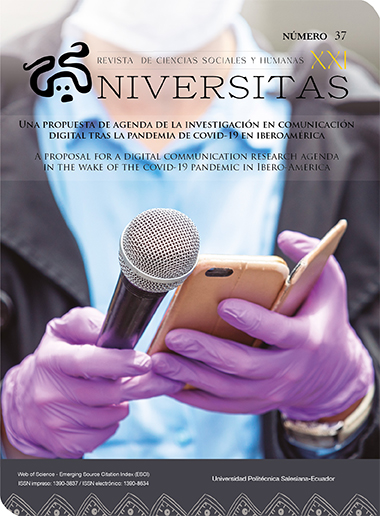Chatbot: comunicación digital y religiosidad tras la pandemia en Latinoamérica
Main Article Content
Abstract
Article Details
Universitas-XXI Journal aligns with the principles of open access and academic collaboration by adopting the Creative Commons Attribution-NonCommercial-ShareAlike 4.0 International License (CC BY-NC-SA 4.0). This license ensures that published content can be used and shared widely under the following conditions:
Attribution: Authors and the journal must be appropriately credited as the original creators of the content, with full reference and a link to the publication provided.
Non-commercial use: Content may not be used for commercial purposes, preserving its academic and educational intent.
ShareAlike: Derivative works must be distributed under the same terms as this license, promoting the creation of accessible and equitable knowledge.
By implementing this license, the Universitas-XXI Journal strengthens its commitment to disseminating high-quality research, providing free access to knowledge, and fostering a collaborative environment among researchers, educators, and students worldwide.
This decision reflects core values of responsibility, ethics, and transparency in academia, ensuring that intellectual contributions serve as a foundation for new research and projects while respecting the rights of authors and the scientific community.
For more information about this license, please visit the following link: https://creativecommons.org/licenses/by-nc-sa/4.0/"
References
Adamopoulou, E. y Moussiades, L. (2020). An overview of chatbot technology. En Maglogiannis, I., Iliadis, L., Pimenidis, E. (eds.), Artificial Intelligence Applications and Innovations. AIAI 2020. IFIP Advances in Information and Communication Technology, 584. Springer, Cham. https://doi.org/10.1007/978-3-030-49186-4_31
Adikari, A., Gamage, G., Silva, D., Mills, N., Wong, S. y Alahakoon, D. (2021). A self structuring artificial intelligence framework for deep emotions modeling and analysis on the social web. Future Generation Computer Systems, 302-315.
Brasil (2022). Ministerio da Saúde. Coronavírus-Brasil. 2022. https://covid.saude.gov.br/
Caldarini, G., Jaf, S. y McGarry, K. A (2022). Literature survey of recent advances in chatbots. Information, 13, 41. https:// doi.org/10.3390/info13010041
Castro, N. (2020). O evangelismo digital resumido em um funil-Parte II. Adventistas.org. 2020. https://bit.ly/3BSwO7P
Fernandes, M. (2019). Mais de 20 mil pessoas já estudaram a Bíblia via WhatsApp com a ajuda de robôs. Adventistas.org, 2019. https://bit.ly/3JMFDSg
Forti, S., Serbena, C. y Scaduto, A. (2020). Mensuração da espiritualidade/religiosidade em saúde no Brasil: uma revisão sistemática. Ciência & Saúde Coletiva, 25, 1463-1474. https://doi.org/10.1590/1413-81232020254.21672018
Frankl, V. E. (1991). A psicoterapia na prática. Papirus.
Frankl, V. E. (1994). Em busca de sentido: um psicólogo no campo de concentração. Vozes.
Hallal, P. C. y Victora, C. (2021). Overcoming Brazil’s monumental COVID-19 failure: an urgent call to action. Nature Medicine, 27(6), 933-933.
Humerez, D., Carvalho, O. H. L., Barduchi, R. y Silva, M. (2020). Saúde mental dos profissionais de enfermagem do Brasil no contexto da pandemia COVID-19: ação do Conselho Federal de Enfermagem. Cogitare enfermagem, 25. https://bit.ly/3JK4Sos
Kang, L., Li, Y., Hu, S., Chen, M., Yang, C., Yang, B. X., Wang, Y., Hu, J., Lai, J., Ma, X., Chen, J., Guan, L., Wang, G., Ma, H. y Liu, Z. (2020). The mental health of medical workers in Wuhan, China dealing with the 2019 novel coronavirus. The Lancet Psychiatry, 7(3), e14. https://doi.org/10.1016/S2215-0366(20)30047-X
Koenig, H., George, L. y Peterson, B. (1998). Religiosity and remission of depression in medically ill older patients. American Journal of Psychiatry, 155(4), 536-542. https://doi.org/10.1176/ajp.155.4.536
Koenig, H., Larson, D. y Larson, S. (2001). Religion and coping with serious medical illness. Annals of Pharmacotherapy, 35(3), 352-359. https://doi.org/10.1345/aph.10215
Lange, J., Heerdink, M. y Kleef, G. (2022). Reading emotions, reading people: Emotion perception and inferences drawn from perceived emotions. Current Opinion in Psychology, 85-90.
Liebrecht, C., Sander, L. y van Hooijdonk, C. (2021). Too Informal? How a Chatbot’s Communication Style Affects Brand Attitude and Quality of Interaction. Chatbot Research and Design. Lecture Notes in Computer Science, 12604. Springer, Cham. https://doi.org/10.1007/978-3-030-68288-0_2
Melo, C., Sampaio, I., de Abreu Souza, D. y Pinto, N. (2015). Correlação entre religiosidade, espiritualidade e qualidade de vida: uma revisão de literatura. Estud. pesqui. psicol. 15(2), 447-464. https://bit.ly/3dm8Lni
Misischia, C., Poecze, F. y Strauss, C. (2022). Chatbots in customer service: Their relevance and impact on service quality. Procedia Computer Science, 421-428. https://doi.org/10.1016/j.procs.2022.03.055
Monteiro, L. (2020). O desafio da pandemia é chance de ascensão espiritual. https://bit.ly/3dgYfxM
Nißen, M., Selimi, D., Janssen, A., Rodríguez, D., Breitner, M., Kowatsch, T. y von Wangenheim (2022). See you soon again, Chatbot? A design taxonomy to characterize user-Chatbot relationships with different time horizons. Computers in Human Behavior, 127. https://doi.org/10.1016/j.chb.2021.107043
OCDE. Organização para Cooperação e Desenvolvimento Econômico (2021). COVID-19 na América Latina e no Caribe: uma visão geral das respostas dos governos à crise. https://bit.ly/3P9BJ77
OPAS. Organização Panamericana de Saúde (2020). Pandemia de COVID-19 golpeou as Américas em 2020. https://bit.ly/3Qx1qzz
OPAS. Organização Panamericana de Saúde. (2022a). Excesso de mortalidade associado à pandemia de COVID-19 foi de 14,9 milhões em 2020 e 2021. https://bit.ly/3dm43Gn
OPAS. Organização Panamericana de Saúde. (2022b). Pandemia de COVID-19 desencadeia aumento de 25% na prevalência de ansiedade e depressão em todo o mundo. https://bit.ly/3QdNBXi
Orellana, J., da Cunha, D., Marrero, L., Moreira, R., Leite, I. y Horta, B. (2020). Explosão da mortalidade no epicentro amazônico da epidemia de COVID-19. Cadernos de Saúde Pública, 36. http://dx.doi.org/10.1590/0102-311X00120020
Orellana, J., da Cunha, D., Marrero, L., Moreira, R., Leite, I. y Horta, B. (2021). Excesso de mortes durante a pandemia de COVID-19: subnotificação e desigualdades regionais no Brasil. Cadernos de Saúde Pública, 37, e00259120. https://doi.org/10.1590/0102-311X00259120
Scorsolini-Comin, F., Rossato, L., da Cunha, V., Correia-Zanini, M. y Pillon, S. (2020). A religiosidade/espiritualidade como recurso no enfrentamento da COVID-19. Revista de Enfermagem do Centro-Oeste Mineiro, 10.
Silva, J. y Silva, L. (2014). Relação entre religião, espiritualidade e sentido da vida. Logos & Existência, 3(2), 203-215.
Tonetti, M. (2021). Como os “robôs” têm ajudado no atendimento à crescente demanda por estudos bíblicos durante a pandemia. Revista Adventista. https://bit.ly/3A9Gqd2
Zhou, Y., Fei, Z., He, Y. y Yang, Z. (2022) How human–chatbot interaction impairs charitable giving: the role of moral judgment. Journal of Business Ethics, 178, 849-865. https://doi.org/10.1007/s10551-022-05045-w

